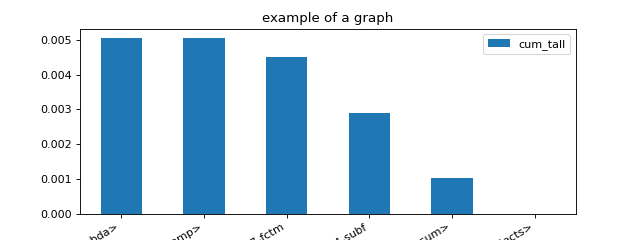profiling¶
ProfileNode¶
- class onnx_array_api.profiling.ProfileNode(filename: str, line: int, func_name: str, nc1: int, nc2: int, tin: float, tall: float)[source]¶
Graph structure to represent a profiling.
- Parameters:
filename – filename
line – line number
func_name – function name
nc1 – number of calls 1
nc2 – number of calls 2
tin – time spent in the function
tout – time spent in the function and in the sub functions
profile¶
- onnx_array_api.profiling.profile(fct: Callable, sort: str = 'cumulative', rootrem: str | None = None, as_df: bool = False, return_results: bool = False, **kwargs) str[source]¶
Profiles the execution of a function.
- Parameters:
fct – function to profile
sort – see sort_stats
rootrem – root to remove in filenames
as_df – return the results as a dataframe and not text
return_results – if True, return results as well (in the first position)
kwargs – additional parameters used to create the profiler, see cProfile.Profile
- Returns:
raw results, statistics text dump (or dataframe is as_df is True)
(
Source code,png,hires.png,pdf)
profile2graph¶
- onnx_array_api.profiling.profile2graph(ps: Stats, clean_text: Callable | None = None, verbose: bool = False, fLOG: Callable | None = None) ProfileNode[source]¶
Converts profiling statistics into a graphs.
- Parameters:
ps – an instance of pstats
clean_text – function to clean function names
verbose – verbosity
fLOG – logging function
- Returns:
an instance of class @see cl ProfileNode
pyinstrument has a nice display to show time spent and call stack at the same time. This function tries to replicate that display based on the results produced by module
cProfile. Here is an example.<<<
import time from onnx_array_api.profiling import profile, profile2graph def fct0(t): time.sleep(t) def fct1(t): time.sleep(t) def fct2(): fct1(0.1) fct1(0.01) def fct3(): fct0(0.2) fct1(0.5) def fct4(): fct2() fct3() ps = profile(fct4)[0] root, nodes = profile2graph(ps, clean_text=lambda x: x.split("/")[-1]) text = root.to_text() print(text)
>>>
fct1 -- 3 3 -- 0.00002 0.61051 -- :11:fct1 (fct1) <built-in method time.sleep> -- 3 3 -- 0.61050 0.61050 -- ~:0:<built-in method time.sleep> (<built-in method time.sleep>) +++ fct4 -- 1 1 -- 0.00001 0.81074 -- :25:fct4 (fct4) fct2 -- 1 1 -- 0.00001 0.11041 -- :15:fct2 (fct2) fct1 -- 2 2 -- 0.00001 0.11040 -- :11:fct1 (fct1) +++ fct3 -- 1 1 -- 0.00001 0.70032 -- :20:fct3 (fct3) fct0 -- 1 1 -- 0.00000 0.20020 -- :7:fct0 (fct0) <built-in method time.sleep> -- 1 1 -- 0.20020 0.20020 -- ~:0:<built-in method time.sleep> (<built-in method time.sleep>) +++ fct1 -- 1 1 -- 0.00000 0.50011 -- :11:fct1 (fct1) +++ <built-in method time.sleep> -- 4 4 -- 0.81069 0.81069 -- ~:0:<built-in method time.sleep> (<built-in method time.sleep>)